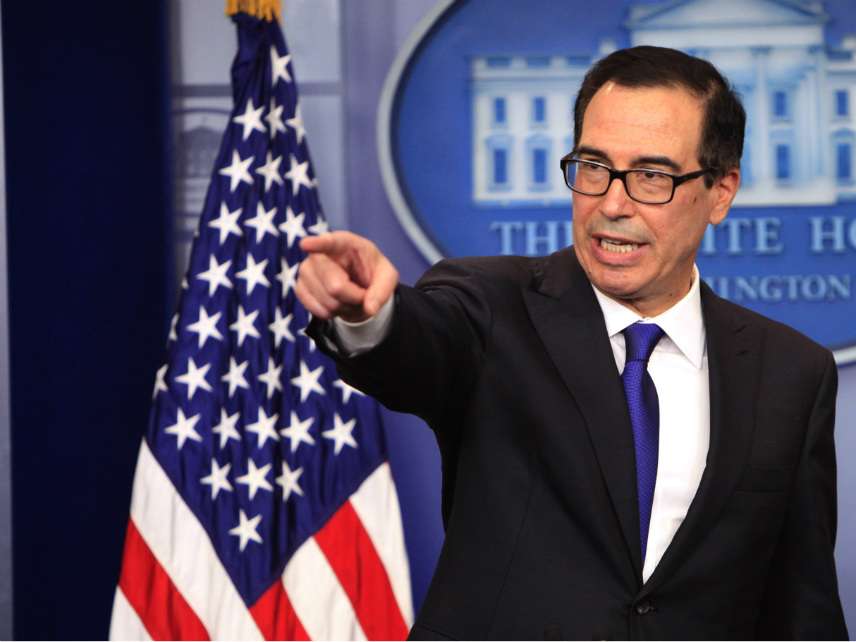Here He Comes to Save the Day! Mighty Mnuchin Is on His Way
The treasury secretary has managed to put off debt ceiling calamity, but otherwise failed to embraced needed spending reforms.

Treasury Secretary Steven Mnuchin claims he has been using his "superpowers" to keep the federal government from defaulting on its debt since April, when the federal debt hit the debt ceiling. This self-labeled superhero is trying to give lawmakers some time until they raise the debt limit, letting them continue to spend above their means. In reality, the superhero thing to do would be to persuade Congress to implement some fiscally responsible reforms that would get us out of the mess we're in, including the perpetual debate about the debt ceiling.
As of today, the federal government owes nearly $20 trillion to foreign and domestic investors. According to the Congressional Budget Office, this is just the beginning; by 2047, our debt will be 150 percent of our gross domestic product—up from a little over 100 percent today—thanks primarily to an aging population and poorly structured entitlement programs. Call me crazy, but I think these numbers speak for themselves, in terms of our need to stop spending money we don't have.
Ironically, the debt ceiling hasn't done much to limit debt accumulation. It was raised 78 times between 1962 and 2012. It was even suspended altogether during the past three years. Not only is the debt ceiling on the rise but also over time the speed of its rise is increasing. From 1989 to 2001, on average the debt ceiling was raised by over $250 billion per year. Between 2002 and 2012, the average debt ceiling increase not only climbed every year but also reached over $1 trillion per year, more than double its previous maximum. (Note: These data don't include the years 2013-17, as the debt ceiling was suspended numerous times in that period.)
The importance of the debt ceiling, however, is less about the role it plays as a constraint on the debt and more about the way it forces a conversation about our debt problem and the need for a solution.
To Mnuchin's credit, unlike his two immediate predecessors, he didn't claim that the debt ceiling had to be raised the minute our debt hit the limit on April 28. Instead, without any drama, he promptly implemented a series of measures (these measures are what he calls his superpowers) to allow more time for lawmakers to raise the debt ceiling. Unfortunately, like his predecessors, he's taking the easy road and asking Congress for a "clean debt ceiling increase" before we hit the Sept. 29 deadline.
The refusal to include institutional reforms and spending caps along with an increase in the government's borrowing authority is, of course, how we got in this mess in the first place. I understand that lawmakers would rather spend as if there's no tomorrow, but I'd hope that the treasury secretary would be more realistic. Apparently not. Mnuchin is no different from his predecessors in failing to demand that we stop kicking the can down the road, forcing future generations to somehow address the problem instead.
During a hearing in July, Mnuchin announced that he has no intention of prioritizing payments to avoid a default until lawmakers reach an agreement about what measures should be used to pay for some of that new future debt. "I think that doesn't make sense," he noted. "The government should honor all of its obligations, and the debt limit should be raised."
I agree that we shouldn't default on our debt, but doing nothing to control government spending is what doesn't make sense. Besides, as the secretary must know, Treasury can prioritize payments, starting with interest on our debt. Last October, Treasury collected $222 billion, and interest payments were $23 billion, leaving plenty of money to pay for the military, Social Security, Medicare, Medicaid and some non-defense discretionary spending. Something similar will happen this October once we breach the debt ceiling. So unless Treasury wants us to default, we won't.
But make no mistake; the negative effects of failing to control our future debt—such as slow growth, higher unemployment and higher taxes—won't be felt immediately, but they'll be real for future generations. As such, the superhero thing to do is to call for action today rather than continue decades of unaccountable, unlimited funding for bloated and unsustainable entitlement programs, such as Medicare and Social Security.


Show Comments (40)